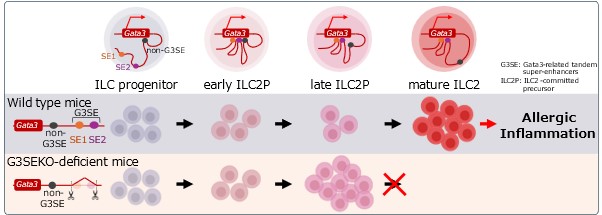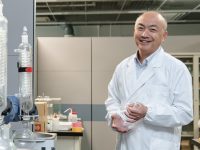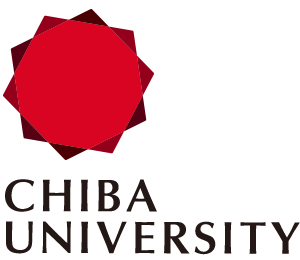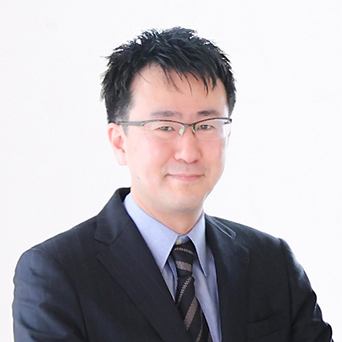Scientists have discovered a novel mechanism of ILC2 immune cell development which may be involved in exacerbating allergic diseases
Group 2 innate lymphoid cells (ILC2s) of the immune system are involved in allergic diseases. But currently, therapy targeting ILC2s is not available. Now, however, in an interesting study, researchers have identified a novel mechanism of ILC2 development. The researchers used single-cell RNA sequencing to discover regulatory regions in the genome that are associated with ILC2 development. These findings can help develop treatment strategies for allergic diseases.

Image title: ILC2 development after ILC2 lineage commitment is dependent on GATA3 induction by G3SE.
Image caption: Researchers identify a G3SE-dependent mechanism of ILC2 development.
Image credit: Yosuke Toda and Arifumi Iwata from Chiba University
Image license: Original content
Usage restrictions: Cannot be reused without permission
Overproduction of Group 2 innate lymphoid cells or ILC2s—a type of white blood cells—can sometimes exacerbate conditions such as bronchial asthma, chronic rhinosinusitis, atopic dermatitis, and organ fibrosis through an exaggerated immune response. Although there are immunomodulatory drugs that can suppress Type 2 helper T (Th2) cells, drugs capable of suppressing ILC2s are currently lacking.
Now, however, in a breakthrough study that could lead to the development of a new therapeutic strategy targeting ILC2s, researchers led by Associate Professor Arifumi Iwata of the Chiba University Hospital, Japan, have identified molecular processes crucial for the maturation of ILC2s. “Although it is clear that Th2 cells and ILC2 play a central role in allergic diseases, the mechanisms of Th2 differentiation and ILC2 development in vivo were largely unknown,” says Dr. Iwata, while explaining the rationale behind the study. Along with Dr. Iwata, Hiroki Furuya, Yosuke Toda, and Hiroshi Nakajima, all from the Graduate School of Medicine at Chiba University, were a part of this study published in Nature Communications on July 5, 2024.
“Since allergic diseases can flare up after discontinuation of current Type 2 cytokine inhibitor drugs, we undertook this study to elucidate and control the upstream regulation of Type 2 cytokine production, i.e., the in vivo Th2 cell differentiation and ILC2 development mechanisms, which we believe are important issues in the control of allergic disease,” adds Dr. Iwata, explaining the specifics of their study further.
All white cells originate from ‘precursors cells,’ which are cells capable of differentiating into B cells, T cells, and innate lymphoid cells (ILCs), including ILC2s. GATA3, a protein produced by the GATA3 gene in humans, is crucial for the proper conversion of precursor cells into ILC2s. In this study, the team of researchers discovered that regulatory regions in the genome, located at 500–764 kb downstream from the Gata3, called GATA3-related tandem super-enhancers or G3SE, are responsible for elevating levels of GATA3 in the bone marrow, which further leads to the conversion of precursor cells to ILC2s.
Using genetically modified G3SE-deficient mice and with methods such as single-cell RNA sequencing and flow cytometry, they found that the GATA3 induction mechanism is crucial during a late stage in ILC2 production. Since the mice lack G3SE, GATA3 levels did not spike sufficiently during this stage in precursor maturation, and as a result, the researchers found the G3SE-deficient mice had significantly low levels of ILC2s.
“We discovered a novel late ILC2-committed precursor stage in the ILC2 differentiation. We also found that the induction of GATA3 expression by an ILC2-specific GATA3 super-enhancers is essential for the differentiation of late ILC2-committed precursors to mature ILC2,” says Dr. Iwata, while talking about the results.
However, on comparing cells from wild-type mice and those from G3SE-deficient mice, the researchers found that the elevation in GATA3 induces ILC2 differentiation through an intermediate step, where levels of a protein called CNOT6L increase. Therefore, targeting the gene that produced this protein could reduce levels of ILC2 in the body. These findings suggest that in the future, gene therapies that target CNOT6L may help avoid exaggerated immune responses due to ILC2s, helping manage a range of diseases.
“While these findings do not directly manage to change the lives of patients, further elucidation of the ILC2-specific differentiation mechanism and development of regulatory mechanisms identified in this study can help develop novel and curative therapies for refractory pathologies of allergic diseases,” concludes a hopeful Dr. Iwata.
About Associate Professor Arifumi Iwata
Dr. Arifumi Iwata is currently an Associate Professor at Chiba University Hospital, Japan. Dr. Iwata has published over 43 scientific articles in the fields of allergy, rheumatology, immunology and genetics, with a focus on inflammation, immunomodulation, molecular pathways of gene expression, therapeutic molecular targets, and others. Dr. Iwata is also a review editor for the journal Frontiers in Immunology.
Funding:
Japan Agency for Medical Research and Development Grant (JP19ek0410043h0003)
Japan Science and Technology Agency (Moonshot R&D) Grant (JPMJMS2025)
AMED SCARDA, Japan Initiative for World-leading Vaccine Research and Development Centers (JP223fa627003)
GSK Japan Research Grant 2020
Reference:
Title of original paper: Stage-specific GATA3 induction promotes ILC2 development after lineage commitment
Authors: Hiroki Furuya1, Yosuke Toda1, Arifumi Iwata1,*, Mizuki Kanai1, Kodai Kato1, Takashi Kumagai1, Takahiro Kageyama1, Shigeru Tanaka1, Lisa Fujimura2, Akemi Sakamoto2,3, Masahiko Hatano2,3, Akira Suto1, Kotaro Suzuki1, and Hiroshi Nakajima1,4
Affiliations:
- Department of Allergy and Clinical Immunology, Graduate School of Medicine, Chiba University
- Biomedical Research Center, Chiba University
- Department of Biomedical Science, Graduate School of Medicine, Chiba University
- Chiba University Synergy Institute for Futuristic Mucosal Vaccine Research and Development (cSIMVa), Chiba, Japan
Journal: Nature Communications
DOI: https://doi.org/10.1038/s41467-024-49881-y
Contact: Arifumi Iwata
Chiba University Hospital/Graduate School of Medicine, Chiba University
Email: aiwata@chiba-u.jp
Public Relations Office, Chiba University
Address: 1-33 Yayoi, Inage, Chiba 263-8522 JAPAN
Email: koho-press@chiba-u.jp
Tel: +81-43-290-2018
Recommend
-

Bringing Japan’s renowned experiment-based science education to Southeast Asia: Developing sustainable physics teaching materials for the pursuit of a disparity-free society
2023.11.24
-
-200x150.jpg)
Research is a Role-Playing Game-Innovation in Drug Discovery Stems from the Ability to Think Deeply
2022.11.07
-

Unlocking Untapped Urban Resources: Driving Carbon Neutrality through Life Cycle Assessment
2023.06.29


